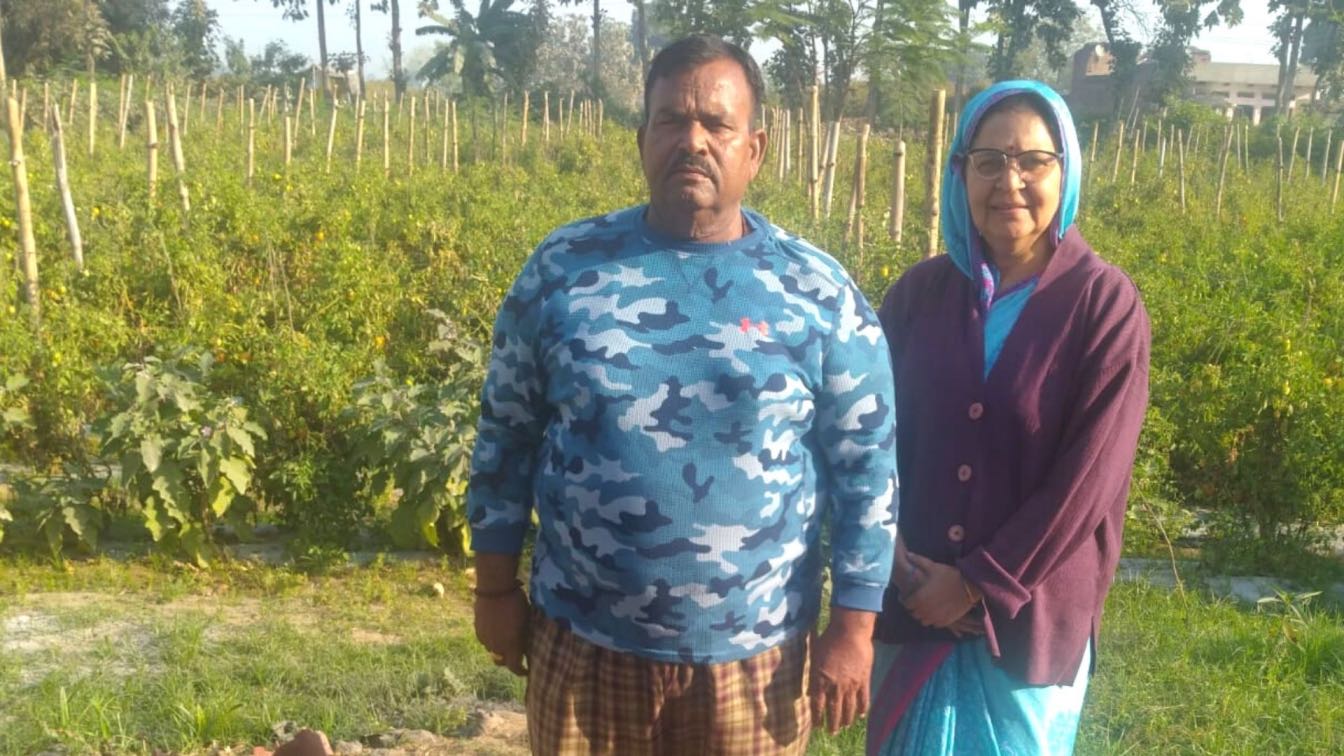In 2017, after Kanak Lata’s husband Vasudev Pandey retired from a co-operative bank, the couple travelled to the USA to spend some months with their son. But, after a while, the couple decided to return to India to spend their retirement in Vittalpur village, which is about 30 km from Mirzapur in Uttar Pradesh.
With no pension to support their expenses, the husband and wife decided to start farming in their 1.5-acre farmland. However, neither of them had the required experience.
“Both of our families have a background in agriculture, and I always saw my grandfather and other relatives toil in the field,” says Kanak. The 57-year-old started with little know-how from her family and grew wheat, peas and tomatoes. But she was not satisfied with the outcome.
“The yield was too little, and the harvest was unstable. The soil fertility was poor and neighbouring farmers taunted us about growing vegetables in low-fertile land,” she says.
After a few setbacks, Kanak built her knowledge on farming and adopted a scientific approach that enabled harvesting 7 quintals every day. Their organic farm produce not only peaked demand in nearby markets but also drew customers from the UK and Oman.
A Scientific Approach

Kanak took special efforts to turn the situation in her favour. For this, she consulted Nav Chetna Agro Center Producer Company Limited, an associate venture under National Bank for Agriculture and Rural Development (NABARD). Undergoing training in organic farming, she loaned Rs 50,000 from Prayatn Sanstha in Delhi to make the required changes on her farm.
“I decided to grow tomatoes and treat the land with organic manure, vermicompost, and enrich it with other natural elements,” Kanak says.
In August 2020, she planted tomatoes of two varieties — Durg and Aryaman. “I harvested the Durg variety recently that instantly became popular in the market. I earned Rs 100 more [as compared to regular tomatoes] per crate. The tomatoes are less sour and more juicy. They also have a thicker flesh that allows for a longer shelf-life,” she says.
District Horticulture Officer (DHO), Mewaram, also visited the farm and took samples from Kanak’s produce. He says, “The tomatoes can last for at least two weeks without storing them in the refrigerator. They are long, round and taste better compared to other desi varieties.”
Kanak claims to harvest 50 crates of fruit every day. “Each crate carries 25 kilos. I earned a decent income that helped to repay the loans and other investments. The profits will start flowing soon and I am expecting to earn around Rs 2.5 lakh,” she adds.
The Tangy Taste of Success

Mukesh Pandey, CEO of Nav Chetna Agro Center Producer Company Limited, says, “Adopting scientific methods, like mulching, drip irrigation and other aspects, helped Kanak achieve success. The tomatoes were sent to Rajbhavan and appreciated by the governor of Uttar Pradesh. She has become an inspiring figure because of her popular tomatoes,” he adds.
Mukesh says that Kanak’s success inspired other farmers in the area as well. “They will grow the tomato variety in the next season,” he adds.
Kanak says that apart from learning farming methods, she overcame issues such as shortage of labourers, water supply and technical difficulties.
Satisfied by her achievement, Kanak is all set to experiment with capsicum, strawberry, dragon fruit and black tomatoes.
“I could taste success because of the guidance of experts in the agriculture field. It feels good to know that people are liking the farm produce and that I continue to get repeat customers. The sight of the flourishing farm is satisfying. And my husband has helped me in this endeavour,” she says.
Vasudev adds here that many people feel depressed after retirement but instead this should be perceived as a new phase of life. “People often feel that their purpose in life is over when they’re retired. But it must be spent by pursuing hobbies and trying out activities that one could not do during their professional career,” he says.
Kanak urges all farmers to use irrigation techniques to save water and electricity. “Mirzapur is a hilly area, and the farmers often face a shortage of water. Drip irrigation will help consume less water and increase yield. Farmers should start trusting scientific methods and give up traditional farming,” she signs off.
Edited by Yoshita Rao
No comments:
Post a Comment